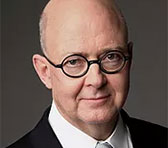29 November 2017
Peggy Glanville-Hicks Address by Kim Williams: a call for urgent action
 Image: Kim Williams
Image: Kim Williams In his Peggy Glanville-Hicks Address, delivered in four Australian cities in November, Kim Williams AM talked about the negative outlook on support for creators of music, and called for urgent attention to the whole policy process, immediate action to renew audience relationships, and the need for individual artists to embrace the opportunities of 'the digital vortex' through energetic self-promotion. The transcript of the entire address is available here.
Kim Williams's Peggy Glanville-Hicks address reads as a defence of cultural diversity, and Australian creative voices, in an age of uncertainty where difference is under assault, and common rights are at risk of being brushed aside. It also calls for decisive action in areas where action has been lacking.
Williams spoke about the importance of symbolic recognition, through his failed attempt to convince the then Prime Minister Tony Abbott, to organise a state funeral service for composer Peter Sculthorpe following his death in 2014.
'That experience of having the Prime Minister reject the state service for Peter Sculthorpe has sat uncomfortably with me for three years', Williams said. 'It feels every bit as outrageous now as it did in its initial delivery. The capacity for the State's generosity of spirit and reflection on those things that matter in our society in the cavalcade of human experience in a relatively young nation, politically at least, matters, profoundly. History matters. Symbols matter.'
He summarised Commonwealth actions affecting the arts since the founding of the the Commonwealth Literary Fund in 1908 - including the establishment of the ABC orchestras, the Australia Council for the Arts, and the Australian National Academy of Music.
'So where do we stand?', Williams asked, and saw improvement in some structural settings, but less so when it comes to individual creators:
'Critically for new music and musicians, the situation, at least from a funding perspective, is not nearly as encouraging as it was, for example, in the 1990s with the Creative Nation funding injections, or, for that matter, the 1970s which saw some remarkable initiatives for creators in all disciplines and dedicated funding for new music ensembles and profuse commissions.'
'Clearly, if the most famous composer of art music in the country, indeed in the country's history, can die with no sense of responsible obligation on the part of a grateful nation to honour him and what he had done for our country and its international creative standing, then something is seriously wrong.'
Williams saw the outlook for the theatre, the visual arts, museums and galleries as relatively positive, however in new music and literature he saw no cause for similar optimism.
'If we are to make a better, stronger cultural connection with today's public and create a more vibrant landscape for composers and performers and the reception of and response to their music, then we need to change the way the policy process works currently. We need to revisit the goals and intended outcomes vigorously.'
Another area of urgent attention was in attracting audiences for new music, and cultivating audience relationships.
'I go to a large number of concerts annually, of all kinds and all forms. Frankly I am too often disappointed at the poor turnout of audiences which seem, if not to age before my eyes, to diminish to a size worthy of Swift's Lilliputians. I volunteer there are some noble exceptions. The diminution is evident across the spectrum... Something is wrong and it has to be addressed. Whilst I accept that art music has always fluctuated in support bases and that there are many variables in modern life, the audience sizes we see increasingly make pain in many a creative heart.'
Because of the influential positions Williams has previously held in the media industry as well as large arts organisations, his thoughts on the digital divide, its effects on the arts industry and individual artists, and the shift of power from producers to citizens were of particular interest.
'One thing is abundantly clear every single day. We have all witnessed, and are now living through, the largest single transfer of power in modern human experience - from producers to consumers, or as I prefer, citizens. How Australia responds will define our modern nation. How artists, scientists, teachers and their interlocutors in the many diverse areas of intellectual and creative devotion, manage this transition will define Australia's social and cultural destiny. The outlook is unclear but there are danger signs aplenty as to poor attention to detail with much flawed thinking. This power transfer is the largest citizen empowerment change ever seen, and it has happened almost entirely from technology. The impact on citizens' behaviours and, more importantly, on expectations, has been overwhelming - a true game changer. The significance of this shift is difficult to exaggerate. Impossible to stop.'
'It offers a territory rich with paradox. Is it a potential empowered paradise or a descent into purgatory?', he asked.
Williams reminded artists of the need to take the responsibility for their own future opportunities through energetic self-promotion.
'The digital divide will be very real and will expand with the fresh irony that the wonder of all that is available will also see a new information "dark age" for many who will be locked out.'
> Peggy Glanville-Hicks Address - more information and transcripts of previous addresses
[Updated - transcript links, May 2021]
© Australian Music Centre (2017) — Permission must be obtained from the AMC if you wish to reproduce this article either online or in print.
Comments
Be the first to share add your thoughts and opinions in response to this article.
You must login to post a comment.